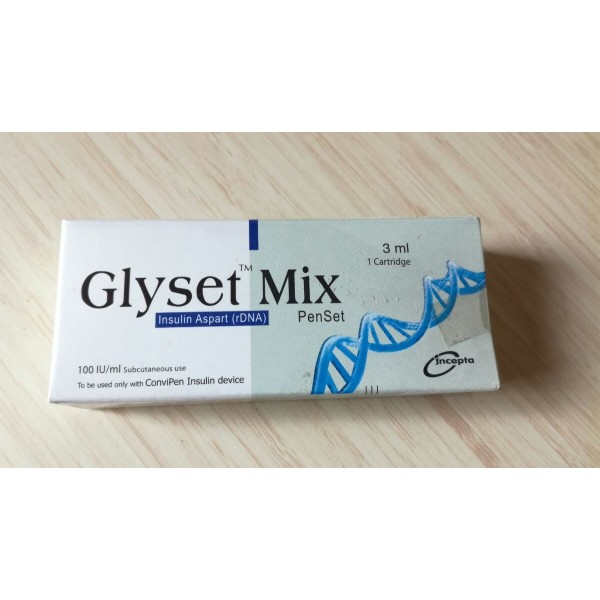
- Stock: In Stock
- Brand: Incepta Pharmaceuticals
- Product ID: Insulin Aspart
100% Secure Payment

Glyset Mix Penset Inj
Description
Glyset Mix (insulin aspart protamine and insulin aspart) is a sterile suspension of human insulin analog containing
30% soluble insulin aspart and 70% protamine-crystallised insulin aspart. Glyset Mix is a blood glucose lowering
agent with an earlier onset and an intermediate duration of action. Insulin Aspart is homologous with regular human
insulin with the exception of a single substitution of the amino acid proline by aspartic acid in position B28, and is
produced by recombinant DNA technology.
Indications
Glyset Mix is an insulin analog indicated to improve glycemic control in patients with diabetes mellitus.
Dosage & Administration
Dosage of Glyset Mix is individual and determined by the physician in accordance with the needs of the patient.
In patients with type 2 diabetes, Glyset Mix can be given in mono therapy or in combination with oral antidiabetic
drugs when the blood glucose is inadequately controlled with those oral antidiabetic drugs alone. For patients with
type 2 diabetes, the recommended starting dose of Glyset Mix is 6 IU at breakfast and 6 IU at dinner (evening meal).
Glyset Mix can also be initiated once daily with 12 IU at dinner (evening meal). When using Glyset Mix once daily, it
is generally recommended to move to twice-daily when reaching 30 units by splitting the dose into equal breakfast
and dinner doses. If twice daily dosing with Glyset Mix results in recurrent daytime hypoglycaemic episodes, the
morning dose can be split into morning and lunchtime doses (thrice daily dosing).
The dose should not be increased if hypoglycemia occurred within three days. Dose adjustments can be made once
a week until target HbA1c is reached.
In patients with type 1 diabetes the individual insulin requirement is usually between 0.5 and 1.0 IU/kg/day. Glyset
Mix may fully or partially meet this requirement. When transferring a patient from biphasic human insulin to Glyset
Mix, start with the same dose and regimen. Then titrate according to individual needs (according to the titration
guidelines in table above). Glyset Mix can be used in elderly patients; however there is limited experience with the
use of Glyset Mix in combination with OADs in patients older than 75 years.
For details,please see enclosed leaflet
Side Effects
Side effects of Insulin Aspart are hypoglycemia, allergic reactions, injection site reaction, lipodystrophy, pruritus and
rash.
Precautions
Dose adjustment and monitoring: Blood glucose should be monitored in all patients treated with insulin. Insulin
regimens should be modified cautiously and only under medical supervision.
Use in Pregnancy & Lactation
Pregnancy: Pregnancy category B.
Lactation: There are no restrictions on treatment with Glyset Mix during lactation. Insulin treatment of the nursing
mother should not affect the baby. However, dosage may need to be adjusted.
Drug Interaction
A number of drugs affect glucose metabolism and may require dose adjustment.
The following substances may reduce the Insulin as well as Insulin Aspart requirements:
Oral anti-diabetic products, angiotensin converting enzyme (ACE) inhibitors, disopyramide, fibrates, fluoxetine,
monoamine oxidase inhibitors, propoxyphene, pentoxifylline, salicylates and sulfonamide antibiotics.
The following substances may increase the Insulin as well as Insulin Aspart requirements:
Thiazides, glucocorticoids, thyroid hormones, beta-sympathomimetics, growth hormone and danazol.
Beta-blockers, clonidine, lithium salts, and alcohol may either potentiate or weaken the blood glucose lowering effect
of insulin.
Over Dose
A specific overdose for insulin cannot be defined, however, hypoglycaemia may develop over sequential stages if too
high doses relative to the patient’s requirement are administered.
Mild hypoglycaemic episodes can be treated by oral administration of glucose or sugary products.
Severe hypoglycaemic episodes, where the patient has become unconscious, can be treated by glucagon (0.5 to 1
mg) given intramuscularly or subcutaneously. Glucose must also be given intravenously if the patient does not
respond to glucagon within 10 to 15 minutes.
Upon regaining consciousness administration of oral carbohydrate is recommended for the patient in order to
prevent relapse.






























